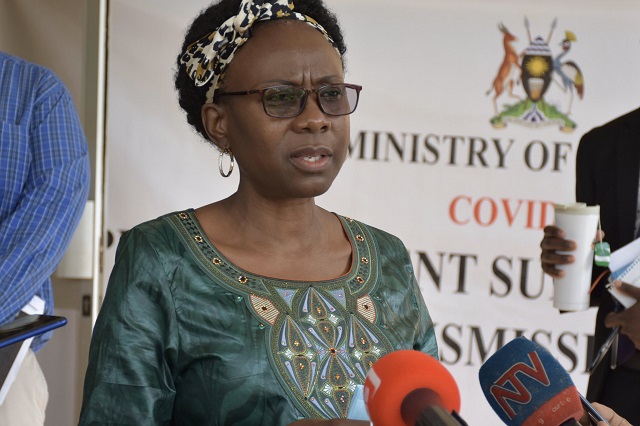
Kampala, Uganda | THE INDEPENDENT | The Ministry of Health has said COVID-19 patients considering home care must have separate rooms, where they can be isolated from other members of the house hold.
The guidelines issued by the health ministry will apply to asymptomatic patients or cases that have mild forms of the disease. Even patients who are not at risk to acquire severe forms of the disease for instance those with existing morbidities like hypertension, diabetes can under go home care.
However, before one is given the green light, they will have to show that they understand and can adhere to the guidelines, live in a home that meets approved criteria.
According to health ministry officials, provision of a room dedicated to the patient is a must have.
A copy of the guidelines that Uganda Radio Network – URN has seen points out that for a home to be approved, the home where the patients will be looked after needs to have a steady source of water or soap, should be near a health facility and needs to be linked to a village Health team worker. The home also needs to have a steady source of food.
All confirmed cases that will undergo home care need to have or show proof that they have a reliable means of transport incase patients need to be rushed to hospital. Those who are positive will not be allowed to travel using public transport like buses, taxis or boda bodas.
In addition to this, if possible, the patient should be provided a separate toilet and the home should have immediate access to a functioning telephone for communication. Those that are positive will have to stay away from persons in the home that are easily susceptible. For instance persons above the age of 60 or those who suffer from conditions that lower the body immunity like cancer, diabetes and HIV.
Both the patient and care giver will also have to follow a number of guidelines. According to the guidelines, both the caregiver and patient will have to agree on a time to receive a follow up phone call from the ministry of health. The care giver chosen should be in good health preferably younger than 60 years of ages with no underlying conditions such as hypertension or diabetes. They should also take care of themselves by always wearing a mask when attending to the patient and making sure they get enough rest.
Care givers will also be mandated to routinely monitor the patients well being and play close attention to whether they develop new symptoms associated with the disease like cough, flu, runny nose, sore throat, shortness of breath, headaches or general body weakness. The care giver will also have to remain in constant communication with ministry of health staff.
On the other hand, while undergoing isolation at home, patients will be required to remain isolated and limit movements in shared rooms like bathrooms, toilet and kitchen. When around other people, they will be expected to wear a mask at all times and continuously wash their hands or use a alcohol based hand rub. Incase they have flu or cough, they will be expected to use disposable paper tissues or clean cloth whenever sneezing. The tissues will be disposed off carefully or burnt to avoid members of the household coming into contact with them.
They will also have to wear masks within the home and also carry out light forms of exercise to keep the body moving.
According to the health ministry, home care is necessary at this point in time to decongest COVID-19 wards that are constantly filling up. Data from the health ministry shows that on average 1,300 new cases and four deaths are recorded every weak. With only 1,300 government beds available to manage the disease, many patients are stuck home because they cannot be admitted.
Kampala which is an infection hot spot accounting for over 30 percent of all cases.A recent National Household Survey indicated that tenements accounted for 64.3 percent of the dwelling units in Kampala with a large populations of these households living in single rooms and crowded environments with poor water supply. It also showed that many of them have low incomes highly dependent on casual jobs, making the guidelines almost impossible for some to follow.
Dr. Charles Olaro, the director of clinical services and COVID-19 treatment facilities says the homes of persons who will undergo home care will have to be assessed before they are given the green light.
He says village health teams or district health officers will be assessing homes before positive patients are allowed to stay there. Only those who qualify will be allowed to stay home. Those who live in small houses will be moved to auxiliary treatment centers while hospitals will be left for very sick patients.
With such circumstances, medics that URN spoke to said that the guidelines thought tough are better than nothing. Dr. Frank Asiimwe, a member of the Uganda Medical Association says the guidelines though touch are good.
“This better than nothing. It is better than having hospitals filled up. Whether people will follow them in another issue all together but it is better than nothing,” he said.
In hospitals, Uganda’s treatment of COVID-19 has been hinged on supply of fruits and some medication where necessary. Patients have been given Vitamin C, zinc and anitbiotics to manage the condition.
Olaro says patients at home are advised not to take drugs unless they are advised by a health worker.
“Taking drugs should be done after they are prescribed by a doctor. We do not want situations where people at home think they are doctors and start buying antibiotics to treat themselves. That might lead to more problems,” he said.
********
URN
 The Independent Uganda: You get the Truth we Pay the Price
The Independent Uganda: You get the Truth we Pay the Price




